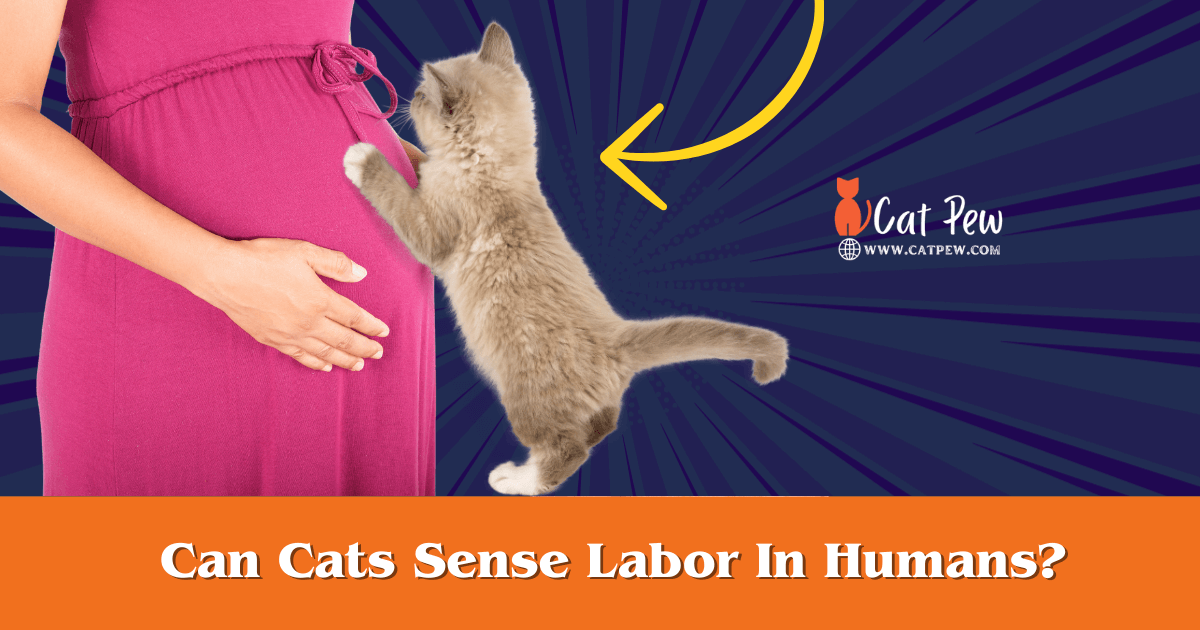Cats can sense labor in humans due to their heightened sense of smell and ability to detect hormonal changes. Cats have a remarkable ability to sense labor in humans.
This is mainly attributed to their acute sense of smell and their ability to detect hormonal changes in the human body. Pregnant women often report that their cats become more affectionate or attentive as they get closer to their due date.
Some cats even display behaviors such as following the expectant mother around, purring more frequently, or curling up next to her belly. While the exact reason behind this intuitive behavior is not entirely understood, it is believed that cats can pick up on the hormonal changes that occur as the body prepares for childbirth. This sensitivity to changes in scent and behavior makes cats unique and perceptive companions during the exciting and transformative journey of pregnancy and labor.
Understanding Cats’ Incredible Sensory Abilities

Cats are renowned for their extraordinary sensory abilities, which allow them to navigate the world in ways that humans can only imagine. From their heightened senses to their exceptional hearing and sense of smell, cats possess incredible sensory abilities that contribute to their reputation as mysterious and intuitive creatures.
Cats’ Heightened Senses
One of the fascinating aspects of cats’ sensory abilities is their heightened senses. While humans rely heavily on their vision, cats rely on a combination of sight, hearing, smell, and touch to navigate and make sense of their environment.
Their heightened senses enable them to detect minute details that often go unnoticed by humans. This heightened sensory perception is particularly evident in situations such as detecting imminent labor in humans, where cats seem to possess an uncanny ability to sense the ongoing process.
The Extraordinary Sense Of Smell In Cats
Cats possess an exceptional sense of smell, which plays a significant role in their ability to sense various changes and events in their surroundings. Their olfactory system is far more developed than that of humans, with as many as 200 million scent receptors in their noses, compared to our measly 5 million.
This remarkable sense of smell allows cats to pick up on subtle changes in chemicals present in their environment, including the pheromones that pregnant women emit during the late stages of pregnancy. It is believed that cats can detect hormonal variations and changes in a pregnant woman’s body, allowing them to sense that labor is approaching.
Cats’ Exceptional Hearing Capabilities
Another remarkable aspect of cats’ sensory abilities lies in their exceptional hearing capabilities. Cats possess a sharp and acute sense of hearing that surpasses that of humans and many other animals. Their ears are designed to capture even the faintest sounds and vibrations, allowing them to detect prey, predators, or even the subtle changes in a human’s body.
With ears that can rotate up to 180 degrees, cats can pinpoint the exact direction of a sound source, whether it be the rustling of leaves or the faintest cry of a newborn baby. This acute sense of hearing may explain why cats seem to be particularly attuned to human sounds during labor, allowing them to provide comfort and companionship during this time.
Overall, cats’ incredible sensory abilities, including their heightened senses, extraordinary sense of smell, and exceptional hearing capabilities, contribute to their mysterious and intuitive nature. While the exact mechanisms by which cats sense labor in humans remain largely unknown, their keen senses undoubtedly play a vital role in their ability to detect subtle changes during this remarkable event.
The Link Between Cats And Human Pregnancy

It is no secret that cats have a unique way of sensing changes in their surroundings. When it comes to humans, their perceptive nature extends beyond the ordinary. There have been numerous anecdotes and stories that suggest that cats can sense labor in humans. While scientific research is limited on this fascinating topic, many pet owners have reported behavioral changes and intuitive actions displayed by their feline friends during pregnancy. Let’s delve deeper into this intriguing connection between cats and human pregnancy.
Cats’ Ability To Detect Changes In The Human Body
One of the most fascinating aspects of cats’ intuitive nature is their ability to detect changes in the human body, particularly during pregnancy. They seem to possess an uncanny sense of smell and can pick up on subtle variations in hormones and pheromones that are released by a pregnant woman’s body. This is believed to be one of the reasons why cats exhibit altered behavior and emotional responses towards expectant mothers.
Behavioral Changes Displayed By Cats During Pregnancy
During pregnancy, cats often exhibit remarkable behavioral changes that cannot be easily ignored. Some cats become more affectionate than usual, seeking constant contact with their pregnant owners. They might rub against their owner’s belly or curl up beside them, providing a soothing presence. This behavior is often interpreted as a sign of the cat’s instinctual protective nature and their ability to sense the vulnerable state of their human companion.
In addition to heightened affection, cats may also display increased attention towards the pregnant woman’s abdomen. They might knead on the belly or lay their paws gently on it as if trying to comfort the growing bump. While these actions might be interpreted as regular feline behavior, many believe that they are indicative of cats’ innate ability to detect the impending arrival of a baby. Some pet owners claim that their cats display such behaviors even before the human mother is aware of her pregnancy.
Investigating The Connection Between Cats And Labor Initiation
While the connection between cats and human pregnancy is intriguing, it is essential to note that more scientific research is needed to understand the exact mechanisms behind these behaviors. Currently, there is limited empirical evidence to support the claim that cats can predict labor initiation. However, the anecdotal experiences shared by many pet owners cannot be dismissed. These stories continue to pique the curiosity of researchers and inspire further exploration into the fascinating relationship between cats and human pregnancy.
In conclusion, while the ability of cats to sense labor in humans remains a mystery, their unique behaviors and intuitive nature during pregnancy cannot be denied. Whether it is their acute sense of smell or their innate protective instincts, cats seem to forge a special connection with pregnant women. While further scientific investigation is required to unravel the intricacies of this bond, the anecdotal evidence provided by pet owners offers a glimpse into the extraordinary world of feline intuition.
The Science Behind Cats Sensing Labor In Humans

Have you ever noticed your cat acting differently when you’re about to go into labor? Many cat owners have reported their feline friends displaying unusual behaviors around pregnant women as if they have an innate ability to sense pending childbirth. While it may seem like a mysterious intuition, there is some science behind cats’ ability to sense labor in humans. In this article, we’ll delve into the role of pheromones in communication, the olfactory abilities of cats, and the theories surrounding how they can detect labor. Let’s uncover the fascinating world of cats and their unique connection to human pregnancy.
The Role Of Pheromones In Communication
One of the key factors behind cats’ ability to sense labor in humans lies in their adeptness at picking up on pheromones. Pheromones are chemical substances produced and released by animals, including humans, that have the power to influence behavior and communication. When a woman is close to giving birth, her body secretes pheromones that can signal to others, including cats, that a significant event is imminent.
Research suggests that these pheromones act as a form of communication between species. Cats have a highly developed sense of smell, with a specialized organ called the vomeronasal organ, also known as Jacobson’s organ, located on the roof of their mouths. This organ enables cats to detect even the slightest traces of pheromones, allowing them to pick up on the changes happening within a pregnant woman’s body.
Cats’ Olfactory Abilities And Hormone Detection
In addition to their exceptional sense of smell, cats possess remarkable olfactory abilities that contribute to their detection of labor in humans. Just like dogs, cats have a sense of smell that far surpasses that of humans. They have approximately 45 to 80 million olfactory receptors, compared to our mere 5 million.
These olfactory receptors not only enable cats to detect pheromones but also aid in hormone detection. During pregnancy, a woman’s body undergoes various hormonal changes, including an increase in estrogen levels. Cats may be able to detect these hormonal changes through their keen sense of smell, allowing them to sense that labor is approaching.
Theories On How Cats Can Sense Labor In Humans
While the exact mechanisms of how cats can sense labor in humans are not yet fully understood, there are several theories that researchers and experts propose. One theory suggests that cats’ ability to detect labor is a result of their acute sensory perception combined with their close bond with their human companions.
Another theory revolves around the idea that cats have heightened instincts that enable them to sense changes in body temperature or movements associated with labor. Cats are naturally attuned to movement, and they may pick up on the subtle shifts and contractions that occur during the early stages of labor.
Ultimately, the ability of cats to sense labor in humans is likely a combination of their heightened senses, olfactory capabilities, and their deep connection with their human companions. While it remains a subject of ongoing research, there’s no denying the fascinating relationship between cats and pregnancy.
Signs That Your Cat Can Sense Your Labor

It’s a remarkable fact that our feline friends, with their keen senses and intuitive nature, can often pick up on subtle changes in our bodies and behaviors. When it comes to pregnancy and labor, many cat owners have reported that their furry companions display unusual behaviors or reactions. In this post, we’ll explore the signs that your cat can sense your labor, offering insights into the changes in their behavior and physical reactions.
Changes In Cat Behavior Before Labor
Before labor begins, some cats may exhibit distinct changes in their behavior that can be indications of their ability to sense what’s about to happen. These changes may include:
- Increased clinginess: Your usually independent cat may become more affectionate and seek out your company more frequently.
- Restlessness: Cats might appear more agitated, pacing around or meowing excessively.
- Seeking out hiding spots: Some cats may retreat to secluded areas, trying to find a safe spot to observe the situation.
- Increased vocalization: You may notice your cat vocalizing more, possibly in an attempt to communicate their concerns or anxiety.
Physical Reactions Exhibited By Cats
Aside from changes in behavior, cats can also have physical reactions when they sense your impending labor. These reactions may vary from cat to cat, but some common physical signs include:
- Dilated pupils: As labor approaches, cats’ pupils may become larger than usual, reflecting their heightened emotions.
- Restlessness and pacing: Cats may continuously move from one room to another, unable to settle down due to their anticipation and sensing of energy changes.
- Increased grooming: Some cats may start to groom themselves excessively as a way to relieve their stress or anxiety.
- Change in appetite: Cats may experience a temporary loss of appetite or show less interest in their regular meals.
Observing Your Cat’s Response To Your Contractions
As your labor progresses and contractions become more intense, it’s worth paying attention to how your cat responds to these powerful surges. Some cat owners have reported the following observations:
- Becoming more alert: Cats may display increased vigilance, perhaps sensing the tension and shifts in energy within the household.
- Altering their position: Cats might position themselves closer to you, seeking to provide comfort or reassurance during this challenging time.
- Unusual vocalizations: Your cat may let out low, purring-like sounds, seemingly trying to offer support or communicate with you in their way.
- Sensing your pain: Cats can be incredibly perceptive, and you might notice that they show concern or become visibly stressed during your contractions.
Of course, every cat is unique, and not all feline companions will exhibit these behaviors or reactions. However, if you notice any unusual signs or changes in your cat’s behavior as your due date approaches, it may be fascinating to consider that your furry friend is tuning into the remarkable journey of bringing new life into the world.
How To Prepare Your Cat For Labor And Delivery

Creating a safe and comfortable space for your cat
Preparing a safe and comfortable space for your cat is crucial during labor and delivery. Cats tend to seek out quiet and secluded areas when they are about to give birth, so providing them with a designated birthing area will help reduce stress and ensure their comfort. Consider the following steps:
- Choose a secluded location: Find a quiet room or corner in your home where your cat can have some privacy. This could be a spare bedroom, a cozy closet, or a quiet area in your basement.
- Make it cozy: Line the area with soft blankets or towels that your cat can nestle into comfortably. The warmth and softness will help create a relaxing environment.
- Keep it clean: Ensure that the birthing area is clean and free from any potential hazards or contaminants. Regularly check and clean the area to maintain hygiene.
- Provide options for hiding: Cats may feel more secure when they have a hiding spot in the birthing area. Consider adding a covered box or a small cat tunnel for your cat to retreat to if needed.
While cats are typically instinctive when it comes to giving birth, it’s important to familiarize them with the birthing process gradually. Here’s how you can introduce your cat to the idea of giving birth:
- Socialize your cat: Spend quality time with your cat, providing gentle petting and affection. This will help create a bond and make your cat feel more comfortable around you.
- Allow your cat to explore the birthing area: Let your cat explore the prepared birthing area before she goes into labor. Allow her to sniff around and get familiar with the space.
- Encourage nesting behavior: Cats often exhibit nesting behaviors before giving birth. Provide materials such as soft blankets, towels, or straws for your cat to arrange and create her nest.
- Monitor and support: Keep a close eye on your cat as she nears her delivery date. If you notice signs of distress or complications, consult with a veterinarian for necessary assistance.
Ensuring your cat has access to food, water, and litter during labor
During labor, it’s essential to ensure your cat has access to necessities. Here’s what you can do:
| Food | Water | Litter |
|---|---|---|
| Place a small amount of easily digestible food near the birthing area, so your cat can eat if she feels hungry during the process. | Keep a fresh bowl of water nearby for your cat to drink from during labor. Make sure to check and refill the water regularly. | Provide a litter box close to the birthing area, allowing your cat to eliminate without having to wander far. |
By creating a safe and comfortable space, introducing your cat to the birthing process, and ensuring access to food, water, and litter during labor, you’re taking important steps to prepare your cat for a smooth and stress-free delivery. Remember, the health and well-being of both your cat and her soon-to-be-born kittens should be a top priority.
Frequently Asked Questions On Can Cats Sense Labor In Humans
Can Cats Sense Labor In Humans?
Yes, cats can sense labor in humans. They have a heightened sense of smell and can pick up the hormonal changes occurring in a pregnant woman’s body. Some cats may act differently and become more protective or clingy as labor approaches.
However, not all cats may exhibit this behavior.
Conclusion
Cats have an incredible ability to sense changes in their surroundings, including a human’s impending labor. Their acute senses and instincts enable them to pick up on the hormonal shifts and behavioral changes that occur during pregnancy and labor. While scientific evidence may be limited, countless anecdotes suggest that cats can indeed sense labor in humans.
So, if your feline friend starts behaving strangely or becomes unusually attentive, it might just be a sign that the arrival of your little one is imminent.

Winston
I'm Winston, the author of this feline-focused (Catpew.com) blog . My love for cats goes back to my childhood, when I spent countless hours playing with my family's tabby, Mittens. This furry friend instilled in me a deep appreciation for the unique personalities, playful nature, and unconditional love that cats offer.

